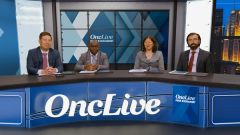
Patient Scenario 1: Newly Diagnosed ES-SCLC With Presence of Hepatic and Brain Metastases
A panel of expert oncologists present the case of a 68-year-old man with newly diagnosed, extensive stage small-cell lung cancer and brain metastases, who is treated with carboplatin, etoposide, and durvalumab, and provide their initial impressions.
Episodes in this series

Transcript:
Taofeek K. Owonikoko, MD, PhD: Thank you all for that initial impression of the disease landscape. We’ll move forward and use some case illustrations to further expand on our approach to the treatment of this disease. I will lead by sharing this patient profile. We have a 68-year-old man who presented with shortness of breath. Notable findings on past medical history were coronary artery disease, hypertension, and A-fib [atrial fibrillation], of course, a former smoker with 60 packs a year smoking history. On imaging, there was evidence of left pleural effusion with even early signs of tamponade. Pathology reveals small cell carcinoma. The patient underwent urgent fluoro-synthesis twice as well as PleurX placement due to persistent re-accumulation of fluid in the pleural cavity. And detailed imaging revealed the presence of pleural hepatic as well as brain metastasis [mets]. Despite the heavy burden of disease, the patient still had a very good performance status of 0, surprisingly, and was initiated on treatment with carboplatin, etoposide, and durvalumab [Imfinzi]. After 2 cycles, as well as following the completion of 4 cycles, there were progressive improvements in the pleural pericardial effusions reduction in the overall metastatic burden, and significant shrinkage in the hepatic metastases. The patient did well, tolerated the treatment with minimal toxicity, and clear improvement in terms of the associated symptoms. So, with this type of patient, let me just open it to the entire panel. What’s your overall impression of this? Is this a typical presentation for you in your practice? Dr Sands, maybe we can start with you?
Jacob Sands, MD: Yeah. I think that’s the exciting thing in the first-line setting actually. Small cell lung cancer [SCLC] is a terrible disease, and we’ll get to later lines, but the first line is when people come in feeling terrible and have this miraculous response to treatment. In some cases, as Dr Chiang described, they come in, get admitted to the hospital with shortness of breath, need oxygen, and sometimes you give them their first cycle of treatment and they leave the hospital off oxygen. You can have these really wonderful initial responses. Now it’s not everybody. So it’s not enough. But it is the majority of patients that really have a benefit. So to have a really nice response to treatment, I think is common. What’s not necessarily as common is having a really nice response to treatment after cycle 2, and then having an even deeper response after cycle 4. I don’t tend to see that as much. Usually by cycle 4 compared to cycle 2 is not as big a change in the scans, which I bring up only to validate the 4 cycles of chemotherapy. And prior to these trials doing more than 4 was considered, and I’m really comfortable with 4, in part based on what I just described.
Taofeek K. Owonikoko, MD, PhD: Dr Chiang, is this typical for your practice as well, this presentation?
Anne Chiang, MD, PhD: I saw this patient last week. [LAUGHTER]. It’s very typical. And I think that this disease can be widely metastatic. I think we still have to learn about what’s the difference between mets to the brain, mets to the plural locally, and mets to pleural effusion and the liver. Some studies show that if you have liver disease, maybe it’s a little worse, and we need to understand that. But overall, I think that these patients end up being widely metastatic. With treatment, they can have a very good response. Sometimes they can go back to work. Sometimes they go back to their regular lives. I do think that we have a responsibility to these patients to prepare them, though, for what may come next and what actually not may come next but very often, there is recurrence in the vast majority of the cases. I think there’s a window there to talk to our patients and make sure they understand and can prepare without giving up hope and we can really make sure they are prepared for what may come next.
Transcript edited for clarity.







































